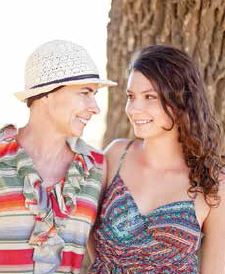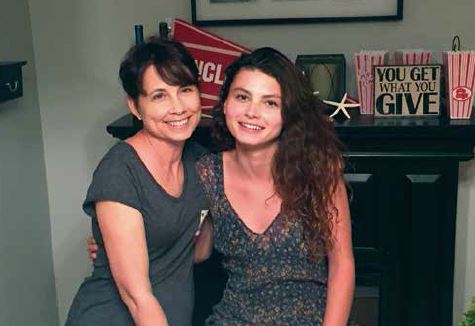
Caring for others and offering support comes naturally to Laurie Moore, a kindergarten teacher and energetic volunteer. However, when faced with a personal health crisis at the age of forty-eight, the upbeat mother of two found it extremely difficult to ask for help.
“I was scared speechless,” she says of her initial reaction to finding out that she had stage III breast cancer. “I couldn’t bring myself to talk to anyone.”
Laurie is quick to admit that she has always been “horrible about delivering bad news.” At first she tried to downplay her diagnosis to her son and daughter, telling them “they didn’t have to worry.” When she finally worked up the courage to call her parents to let them know her biopsy results, Laurie was “afraid to use the ‘C word,’” and instead passed the phone to her husband, John.
Some weeks after starting chemotherapy, Laurie learned that her father also had a malignancy (stage IV lung cancer). His surgery would take place while Laurie was in treatment, two thousand miles away. Laurie remembers, “I longed to go visit Dad in the hospital and it pained me that I couldn’t travel.” Silently, she worried that she might not get to see him again.
Meanwhile, oncologist Fred Kass, MD, suggested Laurie see a genetic counselor, because the type of breast cancer she had, known as ‘triple-negative,’ is often found to be hereditary. Genetic testing revealed that she’d inherited the BRCA-1 gene mutation, which significantly increases the risk for breast and ovarian cancer. Genetic Counselor Danielle Sharaga, MS, LCGC, determined that Laurie’s gene came from her father’s side of the family.
“Suddenly, it wasn’t just about me,” says Laurie, “I was especially concerned for my daughter, Lauren, who was in high school at the time, and also for my newly married niece.”
Laurie, loosening her reserve, now spoke openly and urged members of her family who were potential carriers of the gene to get tested. Laurie adds, “It helped tremendously that Danielle walked me through what I needed to say and provided me with follow up letters.”
It turned out that Laurie’s concern was well founded—both her daughter and her niece had inherited the BRCA-1 gene. Her son had not.
“I dreaded telling Lauren,” says Laurie, “but Dr. Kass assured me it’s really a gift that she find out early, because there are ways to intervene medically to lessen the risk.” Doctors, working closely with genetic counselors, use methods that range from lifestyle and dietary changes to chemoprevention, or the use of pharmaceuticals, to reduce a person’s susceptibility to cancer.
Laurie decided that her daughter had “more to gain from knowing than not knowing.” Now Lauren could choose to seek medical monitoring earlier than she otherwise would have, thereby catching any irregularities that might occur.
After weeks of contending with what she refers to as “a ridiculous run of tough luck,” Laurie finally broke down emotionally. She recalls, “The nurses and staff at the Cancer Center were so loving, and offered such comfort, they were like a mother to me. Their compassion was incredible.”
From that point on, Laurie began to look forward to her chemo appointments as a step in the healing process, rather than “a reminder that I was sick.” Not one to “bring others down,” Laurie showed up to chemo looking put together, “from my wig and hat to my makeup and shoes.”
During the roughest times, maintaining a feeling of connection became essential to her wellbeing. “I had my key people with me when I needed them most,” says Laurie. “John bought special cookbooks, prepared healthy meals, and held the family together.” Her children also rallied their support, as did a couple of close friends who took notes for her during medical and genetic counseling appointments.
The last hurdle before she could be free to visit her father was surgery. “The chemo shrank the tumors,” says Laurie, “and the surgeries eliminated the cancer.” In a series of operations, she underwent a double mastectomy, lymphadenectomy (removal of affected lymph nodes), and oophorectomy (removal of healthy ovaries to prevent ovarian cancer) to eradicate the remaining tumors and to prevent future malignancies.

When Laurie was well enough to travel, she and Lauren boarded an Amtrak train for the forty-hour journey to Chicago. “My daughter helped me cope in every way,” says Laurie. In a reflective essay for a college class, Lauren writes, “Recent months’ experience taught me to show my mom that I am someone she can rely on.”
During what proved to be their last visit with Laurie’s father, mother and daughter shared their grief and appreciation. “Dad was amazing, even toward the end of his life, always looking on the bright side,” says Laurie, “He held on all those months for our visit, and the first thing he said to me was, ‘I like your hair.’” Together, Laurie and Lauren embraced the man who’d set an indelible example of living life fully and joyously.
Her father’s memory inspires Laurie every day. “Dad was a major fundraiser for the Miracle League of Central Illinois, a baseball program for kids with disabilities,” says Laurie. “For me, giving support to others is what I want to do.” In 2016 she has chosen to focus her efforts in behalf of FORCE, a national organization dedicated to fighting hereditary breast and ovarian cancer. “In addition to fundraising and peer counseling, I’m organizing Dragon Boat races, mostly in major cities,” she says. “Crewing the boats helps women that have had breast cancer with upper body exercise, and it’s a wonderful bonding experience.”
As for Lauren, now twenty, she is healthy and thriving in college. She asserts, “I may be young and still learning, but I have the strength to love with all my heart and take care of the people I care about.”
Special thanks to the Cancer Foundation of Santa Barbara for the generous support of the Cancer Center’s Genetic Counseling program.